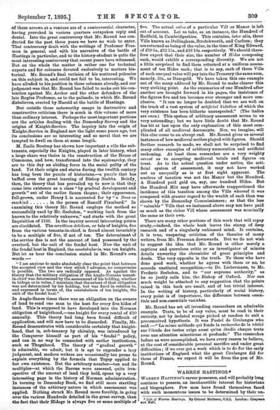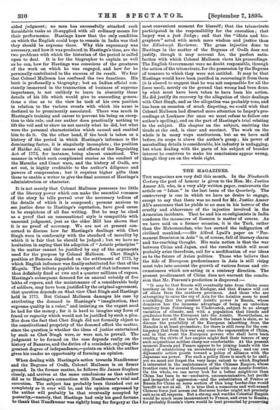WARREN HASTINGS.*
WARREN HASTINGS'S career possesses, and will probably long continue to possess, an inexhaustible interest for historians and biographers. Few men have found themselves faced with such momentous issues to be determined by their un- • Life of Warren Hastings. By Colonel Malleson, 0.8.1. London: Obapnian and Hall.
aided judgment; no man has successfully attacked such formidable tasks so ill-supplied with all ordinary means for their performance. Hastings knew that the only condition on which the English could hope to remain in India was that they should be supreme there. Why this supremacy was necessary, and how it was produced in Hastings's time, are the two problems with which the historian of the period is called upon to deal. It is for the biographer to explain as well as he can, how far Hastings was conscious of the greatness of the work on which he was engaged, and how far he personally contributed to the success of its result. We fear that Colonel Malleson has confused the two functions. His book is professedly a biography ; but an Indian official con- stantly immersed in the transaction of business of supreme importance, is not unlikely to leave in obscurity those details of his life which would give to succeeding genera- tions a clue as to the view he took of his own position in relation to the various events with which his name is destined to be prominently associated. There was much in Hastings's training and career to prevent his being an excep- tion to this role, and our author does practically nothing to lift the veil and to show us not merely what he did, but what were the personal characteristics which caused and enabled him to do it. On the other hand, if the book is taken as a history of the period in which Hastings's influence is the dominating factor, it is singularly incomplete ; the position of Haider Ali, and the causes and effects of the Regulating Act of 1773, for instance, being almost unnoticed. The manner in which such complicated stories as the conduct of the Maratha and Coast wars, and the history of Oudh, are set out, is highly creditable to the author's diligence and powers of compression ; but it requires higher gifts than these to enable a writer to give the final account of Hastings's administration or character.
It is not merely that Colonel Malleson possesses too little of the literary power which can make the essential romance of the story he tells prevail over the necessary tedium of the details of which it is composed ; persons anxious to see justice done to Hastings's reputation, have good cause to be suspicious of all fine writing. But be may be cited as a proof that an unsensational style is compatible with unsound judgment, just as the elder Mill has shown that it is no proof of accuracy. We are not at present con- cerned to discuss how far Hastings's dealings with Chet Singh were in conformity with the standard of morality by which it is fair that he should be judged ; but we have no hesitation in saying that his adoption of "Asiatic principles" in the matter cannot be justified by any of the arguments used for the purpose by Colonel Malleaon. Chet Singh's position at Banaras depended on the settlement of 1775, by which English influence was finally substituted for that of the Moguls. The tribute payable in respect of that influence was then definitely fixed at two and a quarter millions of rupees. Hastings's subsequent demand for an annual subsidy of five lakhs of rupees, and the maintenance of a considerable body of soldiers, may have been justified by the original agreement, that question depends on *hat view Chet Singh and Hastings held in 1775. But Colonel Malleson damages his case by attributing the demand to Hastings's " imagination, that supreme quality in a ruler," and insisting on the urgent need he had for the money ; for it is hard to imagine any form of fraud or rapacity which would not be justified by such a plea. Nor does the fact that Chet Singh did not formally object to the constitutional propriety of the demand affect the matter, since the question is whether the ideas of justice entertained by such as Chet-Singh were, or were not, to prevail. The judgment to be formed on the case depends really on the history of Banaras, and the duties of a zemindar, enjoying the greatest degree of independence,—points on which the author gives his reader no opportunity of forming an opinion.
When dealing with Hastings's action towards Nandkumar and the Begums of Oudh, Colonel Malleson is on firmer ground. In the former matter, he follows Sir James Stephen closely, and arrives at the same conclusions as that author did as to Hastings's connection with Nandkumar's trial and execution. The subject has probably been thrashed out as completely as it ever will be, and the opinion expressed by the author will probably be that eventually accepted by posterity,—namely, that Hastings had only his good fortune 'to thank that Nandkumar was rightly hung for forgery at the most convenient moment for himself; that the triumvirate participated in the responsibility for the execution ; that Impey was a just Judge ; and that the "idiots and bio- graphers" acted with much more wisdom and justice than the Edinburgh Reviewer. The gross injustice done to Hastings in the matter of the Begums of Oudh does not justify, though it may account for, the perfect satis- faction with which Colonel Malleson views his proceedings. The English Government were no doubt responsible, through the action of the triumvirate, for the possession by the Begums of treasure to which they were not entitled. It may be that Hastings would have been justified in recovering it from them (it is absurd to suggest that he was not responsible for all the force used), merely on the ground that wrong had been done, by what must have been taken to have been his action. He did justify its recovery by the allegation of their dealings with Chet Singh, and as the allegation was probably true, and has been an occasion of much disputing, we could wish that Colonel Malleson had directed more attention to Impey's pro- ceedings at Lucknow (for once we must refuse to follow our author's spelling), and on the part of Hastings's trial relating to the subject. His chapter on the subject, omitting the tirade at the end, is clear and succinct. The work on the whole is in many ways meritorious, but as we have said before, its scope is above the author's grasp ; his power of marshalling details is considerable, his industry is unflagging, but when dealing with the parts of his subject of broader interest he contrives to make his conclusions appear wrong, though they rye on the whole right.



































 Previous page
Previous page